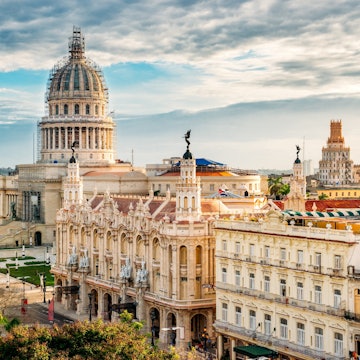
Nov 5, 20192 min read
What you need to know about the US ban on flights to Cuban cities outside Havana
Jul 10, 2020 • 4 min read

The virus isn't going away, and we need to learn to live with it © den-belitsky via Getty Images
A few days ago, in an interview on Irish radio, I made an argument in favor of renewing foreign travel. I talked about how the travel industry had cranked the gears and was cautiously coming back to life after months of mothballed inactivity. How Europe was open to visitors from other European countries. How Ryanair, Europe’s largest airline, had ramped up its schedule from July 1 and was now flying 1000 flights a day – less than half of the 2400 flights it operates normally but still a combative expression of optimism in the face of a crisis without parallel in our lifetimes.
A flurry of text messages to the show soon followed, as did a series of tweets. Even allowing for the producer’s natural instinct to cherry-pick the texts that would provoke the biggest response, the general message was unequivocal: to even talk about foreign travel right now is irresponsibly self-indulgent.
I get it. Nobody wants to go back into lockdown, and every picture of a crowded British beach or a packed bar in Florida is not just an example of reckless stupidity but an affront to the millions who’ve endured hardships and made enormous sacrifices in the fight against COVID-19. Failure to fully engage with the threat of the virus has led to tragic outcomes in the US, while a cavalier attitude toward the pandemic in the first weeks led to UK deaths being much higher than they should have been.
Conspiracy theorists aside, the vast majority of people appreciate the seriousness of the situation and have done what was asked of them with admirable determination and fortitude.
But here’s the rub: the virus isn’t going anywhere soon. We have made huge efforts to flatten the curve, but there’s no sign of a vaccine to eliminate it altogether, so we will have to live with COVID-19 for the foreseeable future.
And living with the virus means incorporating measures to restrict the spread of the virus into our daily lives, not halting our lives until the spread of the virus has been stopped entirely. To be forever in lockdown, forever without travel, is impractical and potentially disastrous – if only to the millions of people throughout the world whose livelihoods rely on travel and tourism.
Which means we need to start traveling again. But encouraging travel is not encouraging a lack of responsibility, nor is the desire to travel incompatible with being careful to contain the virus’ deadly spread.

All over Europe, countries have begun opening their borders to tourism, but have established strict guidelines on how visitors can access the country and how they must behave while there. Masks are compulsory in most indoor spaces and any place where social distancing cannot be safely practiced – under penalty of law.
The stay-at-home argument is a strong one – by not traveling you’re not only staying within your national bubble, but you can focus on giving much-needed help to domestic tourism, which some have argued is everyone’s patriotic duty. Very sensible, and even noble – but some push the argument to its extreme and declare that anyone who takes a holiday abroad is not just unpatriotic but an inherent danger to the health of the nation.
And that’s before you even mention getting on a plane. Even allowing for the wearing of masks, the thought of spending a couple of hours cheek by jowl with a stranger after months of carefully maintaining a distance from anyone not in our immediate households is just too much for some people to contemplate.
But did you know that according to the WHO and the European Aviation Safety Agency, cabin air inside an aircraft is changed every three minutes and passes through a HEPA filter that removes 99.97% of particulates the size of coronavirus, virtually eliminating the risk of transmitting a communicable disease?

As for the decision to travel in the first place, it may be grossly irresponsible to fly to Florida right now, but there are plenty of destinations where it’s perfectly safe to go – so long as you follow all local rules. Take Croatia, for example: as of July 3, this country of roughly 4 million people had 3325 confirmed cases and 114 deaths – one of the lowest rates in Europe. On the balance of probability, I’m safer in Dubrovnik – which had no reported cases – than I am in Dublin, especially as Croatia enforces rules on the wearing of masks and maintaining social distancing far more rigorously than they do at home in Ireland.
Even in ordinary times, all travel comes with a burden of responsibility. To the environment, to those places we visit, to the people we encounter while we’re there. The current crisis brings with it an added – and occasionally onerous – duty of care, but the solution is to negotiate each new challenge, not to shy away from it. My one rule is to follow the rules: as soon as I’m allowed to travel, I will.
How to prepare for your first post-COVID trip
No face mask, no flight: the new rule of travel?
An expert's safety checklist if you need to travel now